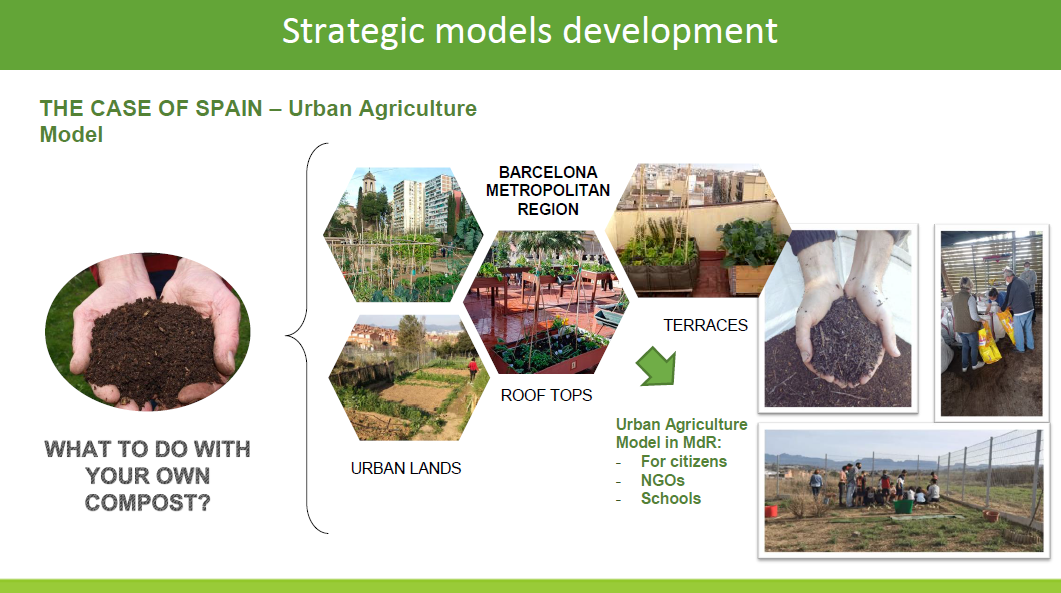MED-InA: peer pilot projects share feedback on installing composting equipment

Organised by AViTeM, lead beneficiary of MED-InA project, on 24th August 2022, an online mentoring session was proposed to the 3 MED-InA pilot city´s staff: Irbid (Jordan), Carcaixent (Spain) and La Marsa (Tunisia). This comes as they prepare to deploy new waste management equipment and facilities in the framework of their revised Integrated Solid Waste Management Plans (ISWMP), developed in 2021 with the support of local experts and the Jordan University of Science and Technology (JUST), one of the Jordanian parnter of MED-InA, and adopted in 2022.
Four pilot partners from fellow ENI CBC Med projects (DECOST and CLIMA) accepted to share their experience in setting and installing various composting systems, equipment and facilities; these pilots are located in Lebanon, Palestine, Spain and Tunisia.
Each project quickly presented their approach:
- The CLIMA project goal is to upgrade the waste cycle management and contribute to the reduction of waste production in pilot municipal areas in Italy, Lebanon and Tunisia by boosting sorting policies and technologies and enhancing the economic value of the organic component as secondary raw material.
- The DECOST project goal is to build a closed-loop system of organic waste valorisation, integrating decentralised home and community composting systems with urban agriculture, by using a people-centered approach, empowering civil society and increasing institutional capacity building in Italy, Jordan, Palestine and Spain.
A few words about the 4 pilot sites who presented their work:
- The city of Mahdia (Tunisia)
The city of Mahdia is currently establishing its composting site: the location was picked in the west side of the city and citizens were informed of the new facility project and what it entails in terms of uses and waste management. The approach adopted is the following:
- Sorting at source (distribution of individual bins and training of inhabitants)
- Purchasing of a truck to ensure the collection (with a collection schedule), compostable waste going directly to the composting centre and non-compostable waste to be valued in collaboration with local start-ups involved in the field.
- Use of the final product by the city’s farmers, to contribute to a circular economy loop between citizens and farmers.
- 1st objective is process 5 tons per day, then the site should be extended to reach a 10-tons per day processing capacity.
- Extension of the experience to other residential neighbourhoods in the city
More information here: https://enicbcmed.eu/clima-waste-management-mahdia-pilot-compost-site-has-found-its-place
- The municipality of Bikfaya (Lebanon)
Membrane composting pilot installed in a pre-existing waste management facility, which did not value organic waste before. Why a membrane? Because covering organic waste:
- Brings all raw materials up to a temperature of 55°C
- Acts as biofilter for odor control, absorbing VOC (volatil organic compounds) and ammonia
- Retains nutrients
- Controls flies
- Retains moisture
- Retains odors, dust and germs
- Prevents rainwater penetration
Probes and sensors are inserted inside these membranes to control temperature and oxygen throughout the composting process. To overcome the huge challenges related to Lebanon’s economic and financial crisis and the increase in fuel prices and electricity cut offs, assessments are underway to install solar panels to power the facility.
More information here: www.enicbcmed.eu/clima-inaugurates-special-membrane-composting-organic-waste-municipality-bickfaya-lebanon
- The municipality of Anabta (Palestine)
Development of waste management system in Anabta (Tulkarem, northern West Bank), based on decentralised composting, unlike other projects constructing a plant for the composting process. So home composting and community composting systems. The Kadoori University in agreement with Anabta municipality, has started supplying and installing home composting units:
- Home composting in Kufr Rumman (90 composters, 300L each)
- Home composting in remote areas of Anabta (300 composters, 300L each)
- Community composting in downtown Anabta (one composter, 7m3)
The project has had a very tangible impact so far, thanks to:
- Significant awareness campaigns, events and workshops were held (social media, schools, TV, radio, meetings with locals and influencers, brochures, videos).
- Follow-up with on-site visits to residents to help them with the composting protocol tested and developed by the university, prevent or fix any issues, and ensure quality control as well as in-lab testing for research and development purposes.
- Many success stories of composting production and use, discussion panels between participants who developed the composting skill and new affiliates to transfer knowledge and experience.
More information here: https://www.decost.ps/en
- The municipality of Les Masies de Roda (Spain)
The vision of the composting system is that every citizen needs to have a composting site less than 100 meters from his/her house. Municipal mapping was carried out, and depending on the density in each area, the number of composters will vary. This led to the establishment of 14 sites overall, with 62 composters installed, and DECOST partner, the University of Vic, has been ensuring the management, maintenance and optimisation.
The pilot includes a strong information and awareness component, as the compost is made with the inhabitants’ organic waste, and given back to them for their personal use (gardening, urban agriculture…)
- Informative sessions (importance of properly sorting materials for recycling and value)
- Delivery of material (compostable bags, organic matter bins, personal cards, informative brochures…)
- Awareness activities for all ages (composters exhibition, recycling activities, garden pocket kits…)
Results include:
- Almost 100% of organic matter collected and recycled in situ
- Easy system of door-to-door collection implemented for sorted materials
- Operational costs of the system economically competitive
- Incrementation of local job offers
- Citizens co-reponsible for waste management and benefit from the compost produced
More information here: www.enicbcmed.eu/excellent-results-and-new-product-developed-thanks-decost-pilot-implementation-masies-de-roda









